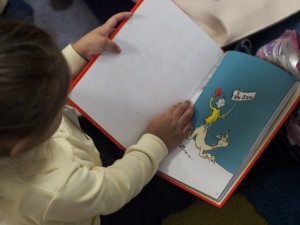It Takes Less Than Half An Hour To Change A Child's Life
First Book provides badly-needed books to kids, but it’s up to educators and parents to help their children open up those brand-new books and become readers. Read Aloud 15 MINUTES is one of the many terrific programs that makes this possible.
Read Aloud board member Jennifer Liu Bryan recently explained how our two missions align and why it’s so important to read aloud for 15 minutes a day, especially to kids in under-served communities.
Q: How do Read Aloud and First Book work together?
 Read Aloud: First Book’s mission provides the essential raw materials: Books. Books for eager young hands to possess, to cherish – to read. Read Aloud 15 MINUTES’ mission provides the marching orders: Engage. Once those reading materials are in hand, there is no better way to prepare a child for reading and learning than to read aloud to him or her every day, for at least 15 minutes.
Read Aloud: First Book’s mission provides the essential raw materials: Books. Books for eager young hands to possess, to cherish – to read. Read Aloud 15 MINUTES’ mission provides the marching orders: Engage. Once those reading materials are in hand, there is no better way to prepare a child for reading and learning than to read aloud to him or her every day, for at least 15 minutes.
Read Aloud 15 MINUTES and First Book’s missions join together like two pieces of the literacy puzzle. Approaching the problem from two different angles, both non-profits share the same goal: To grow literacy, improve education and change lives in this country for the better.
The missions intertwine and intersect wherever there are children who yearn to learn and caregivers who want the best for them. In other words, our missions overlap everywhere.
Q: First Book specifically serves kids in under resourced communities. How is reading aloud to these kids for 15 minutes a day even more important because of that?
 Read Aloud: Our message is directed at parents and caregivers everywhere, because it is imperative and applicable to children everywhere. But it is especially critical that our message be heard where the barriers to success are highest, in under-resourced communities.
Read Aloud: Our message is directed at parents and caregivers everywhere, because it is imperative and applicable to children everywhere. But it is especially critical that our message be heard where the barriers to success are highest, in under-resourced communities.
The disparities are alarming:
- By age four, low-income children have heard an average 32 million fewer words than their wealthy peers.
- By kindergarten, some low-income children have been read aloud to as few as 25 hours while their middle-income peers have been read aloud to as many as 1,000.
These statistics add up to real life consequences: failure to learn and failure to succeed at school.
Reading Aloud for 15 minutes a day is a small commitment, but for children – particularly in under-resourced communities – it can make a lifetime of difference.
To learn more about why reading aloud will make a difference in your children’s lives, visit our partner Read Aloud 15 MINUTES.
